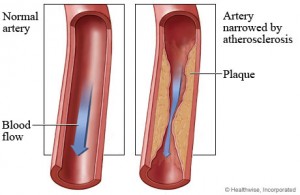Particulate Matter (PM) Pollution Linked to Hardening of the Arteries
 Residents who live in more polluted parts of their town may have as much as a 2% greater risk of strokes and heart attacks than people who live in areas with cleaner air. That's the conclusion of a new study that specifically links PM 2.5 – that is soot or particulate matter that is 2.5 microns or less in size – to accelerating atherosclerosis, or hardening of the arteries.
Residents who live in more polluted parts of their town may have as much as a 2% greater risk of strokes and heart attacks than people who live in areas with cleaner air. That's the conclusion of a new study that specifically links PM 2.5 – that is soot or particulate matter that is 2.5 microns or less in size – to accelerating atherosclerosis, or hardening of the arteries.
Researchers from the University of Michigan School of Public Health and the University of Washington followed 5,362 people between the ages of 45 and 84 from six regions in the U.S.: Baltimore, Maryland, Forsyth County, North Carolina, Los Angeles County, California, Northern Manhattan and Southern Bronx, New York and St. Paul, Minnesota.
After accounting for behaviors like smoking, which can independently affect heart disease risk, they found that the thickness of the carotid arteries that supply blood to the head and neck increased by 14 µm each year. Participants who were exposed to higher levels of air pollution in their home had blood vessels that thickened faster compared to others living in their area with lower exposure levels.
Thickening of blood vessels is a sign of hardening of the arteries, as inflammation lures in clotting factors and other immune agents to patch up worn areas; as these compounds build, the vessels stiffen and thicken, losing their ability to flex and adjust to the varying levels of pressure created by the blood flow.
High levels of a fine air pollutant called PM2.5 was specifically linked with faster thickening of the inner two layers of the carotid artery, a vessel that serves as a sentinel for the state of other arteries throughout the body. However, the study also showed that if levels of PM2.5 were reduced in the participants’ homes, the pace of thickening slowed.
